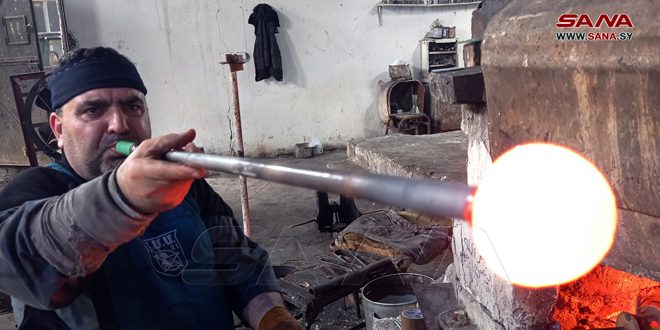The town of Urem Al-Kubra in Aleppo province in the north of Syria has historically been famous for its skilled glassblowing craftsmen.
The war considerably affected this traditional craft inherited from ancestors, but after the liberation of the city from terrorism, some artisans have brought it back to life.
The artisan, Yassin Arab learned the glassblowing craft from his father when he was a child, and after the town was liberated from terrorism, he returned to his small facility, where he worked to restore it and start working again.
Arab does not hide his enormous passion for the craft of glassblowing and his belief in the need to preserve this ancient Syrian heritage.
Regarding the working mechanism, the artisan explained to SANA that he uses recycled glass, melts it again in the oven at high temperature, and then chooses a specific shape for its manufacture, whether hookah bottles, vases, plates, small jugs, fish houses for decoration, decorated cups and antiques of different sizes.
After that, the piece is blown, rotated and processed by the artisan until it takes its final shape using white and brown colors, and once the manufacturing of the product is finished, it is decorated and colored to give it the required aesthetics.
For his part, Hussein Najjar noted that he learned the craft of blowing glass manually since he was young and has been working in this field for 40 years.
He added that he is able to make any shape or glass container, using his imagination, and considered that the art of glassblowing is one of the types of plastic arts.
Traditional glassblowing is a profession that dates back more than two thousand years (since the time of the Phoenicians) and was included in December 2023 by UNESCO on the list of intangible cultural heritage of humanity that needs urgent preservation.

